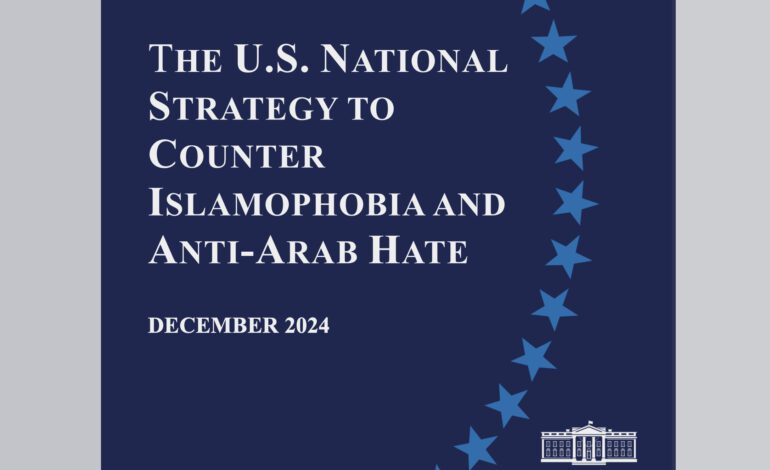On Thursday, the White House released the first-ever U.S. National Strategy to Counter Islamophobia and Anti-Arab Hate. The Strategy was developed through a whole-of-government collaboration with a broad range of civil society partners to describe and address the bias, discrimination and threats Muslim and Arab Americans have long faced. Over the past year, this initiative has become even more important as threats against American Muslim and Arab communities have spiked. In October 2023, 6-year-old Wadee Alfayoumi, an American Muslim boy of Palestinian descent, was viciously killed in his home in Illinois and over the last year there have been other grievous attacks on Muslim and Arab Americans.
The Strategy contains more than 100 Executive Branch actions and more than 100 calls to action to every sector of society to prevent and address such violent attacks and to ensure that Muslim and Arab Americans enjoy the liberties and opportunities that are the bedrock of our country. With this initiative, the Biden administration is creating a path for progress, in partnership with all levels of government, civil society and the private sector, both now and over the long term.

6-year-old Wadee Alfayoumi was stabbed to death on Oct. 14, 2023, inside his family’s Plainfield Township home. The family’s landlord has been charged in the slaying. The boy’s mother was also injured.
In December 2022, when President Biden established an interagency group to increase and better coordinate efforts to counter Anti-Semitism, Islamophobia and related forms of bias and discrimination, work began on this Strategy. In 2023, the Biden-Harris administration released the first-ever National Strategy to Combat Anti-Semitism and announced the development of the first-ever National Strategy to Counter Islamophobia and Anti-Arab Hate. This latest strategy has four priorities:
Increase awareness of hatred against Muslims and Arabs and broaden recognition of these communities’ heritages. Muslims and Arab Americans have helped build our country since its founding, but they have also routinely experienced hate, discrimination and bias due to baseless stereotypes, fearmongering and prejudice. While individuals have sometimes been targeted because they are thought to be Muslim, it is also crucial to recognize that Arabs are routinely targeted simply for being who they are. Through new data collection and innovative educational efforts, the administration is increasing awareness of these forms of hate as well of the proud heritages of Muslim and Arab Americans.
Improve safety and security for Muslims and Arabs. Everyone deserves to live their lives without fear of violence, harassment or discrimination. The Strategy addresses the targeting of Muslim and Arab communities, including through unprecedented investments in strengthening the security of nonprofits and increased efforts to ensure easier access to those funds; correction of discriminatory travel restrictions; and new tools to address transnational repression, doxing, swatting and hoax threats. It also seeks to reduce trust deficits between government and community members such as by sharing successful practices of engaging Muslim and Arab Americans in the reporting of hate crimes. The Strategy recognizes our utmost duty to protect the nation from terrorist threats and attacks while safeguarding everyone’s civil rights and civil liberties.
Tackle discrimination against Muslims and Arabs and appropriately accommodate their religious practices. Muslim and Arab Americans have long faced discrimination in settings such as education, employment, public accommodations, land use, housing, health care and access to financial services. More agencies are making it clear that discrimination against Muslim and Arab Americans in federally funded activities is illegal, and the administration has instituted new practices to accommodate religion and produced a wide range of resources and trainings on nondiscrimination and religious freedom.
Continue to build cross-community solidarity and collective action to counter hate. Threats to one community must be treated as threats to all. Increasing cross-community collaboration continues to be a key part of administration efforts to protect the safety of all Americans, including through new partnerships that build solidarity among communities of diverse faiths and beliefs.
We urge our state, local and international counterparts, as well as the nongovernmental sector, to pursue similar initiatives that seek to build greater unity by recognizing our common humanity, affirming our shared values and history, and embracing equal justice, liberty and security for all.
– The White House. Edited for style.






Leave a Reply